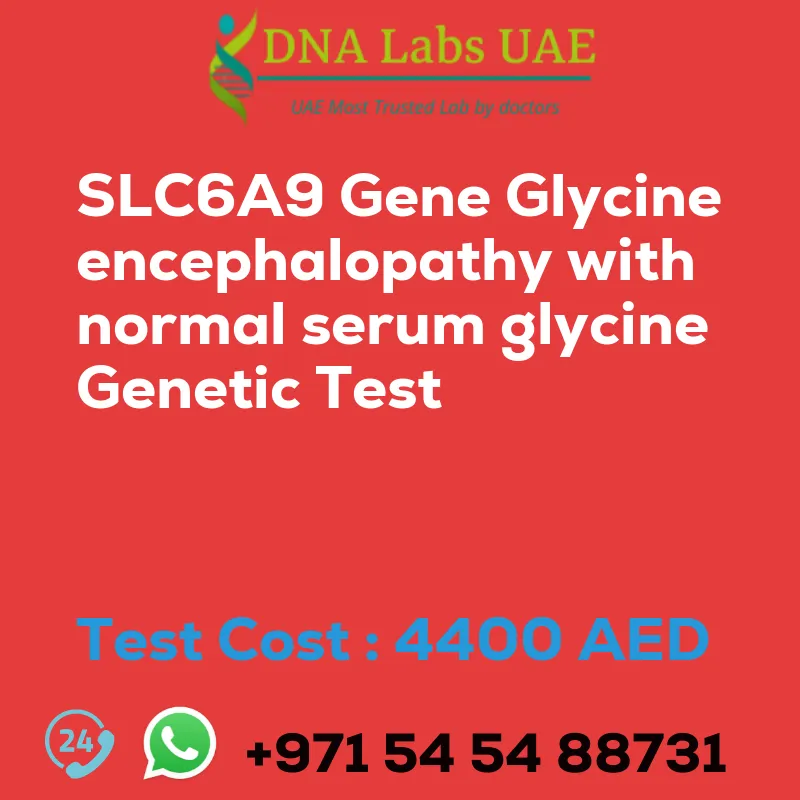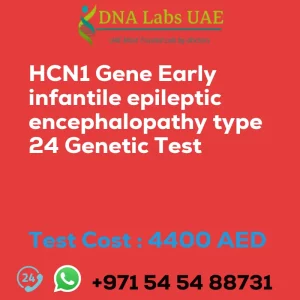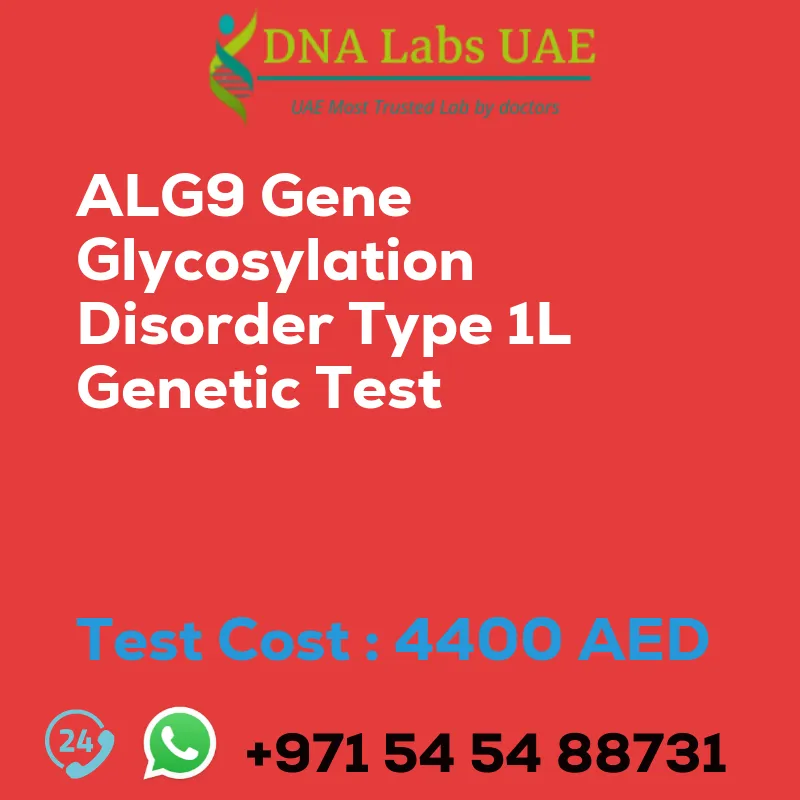
Search Results for: results

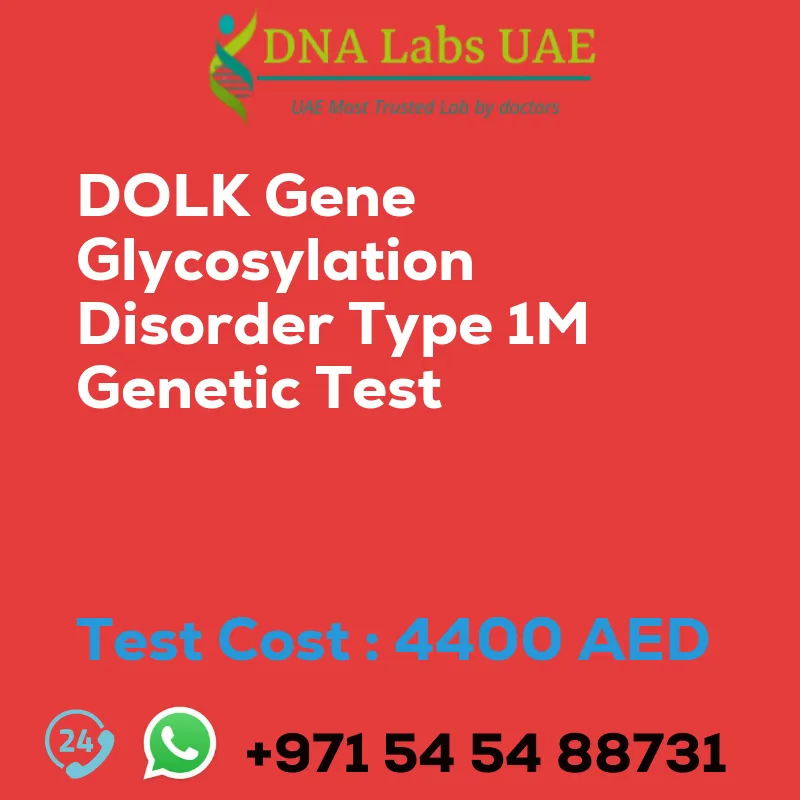
DOLK Gene Glycosylation Disorder Type 1M Genetic Test Cost
The "DOLK Gene Glycosylation Disorder Type 1M Genetic Test" is a specialized diagnostic tool available at DNA Labs UAE, designed to identify mutations in the DOLK gene, which are responsible for a rare genetic condition known as Congenital Disorders of Glycosylation Type 1m (CDG-1m). This condition affects the body's ability to properly attach sugar molecules to proteins, a process essential for various bodily functions. Symptoms can range from mild to severe and may include developmental delay, skin abnormalities, and problems with the nervous system and internal organs. The test, priced at 4400 AED, involves analyzing the patient's DNA to look for specific mutations in the DOLK gene that are indicative of the disorder. This is crucial for confirming the diagnosis, understanding the disease's progression, and potentially guiding treatment options. Conducted at DNA Labs UAE, the test represents an important step towards personalized medicine, offering hope to families affected by this rare condition by providing them with accurate diagnoses and the possibility of targeted interventions.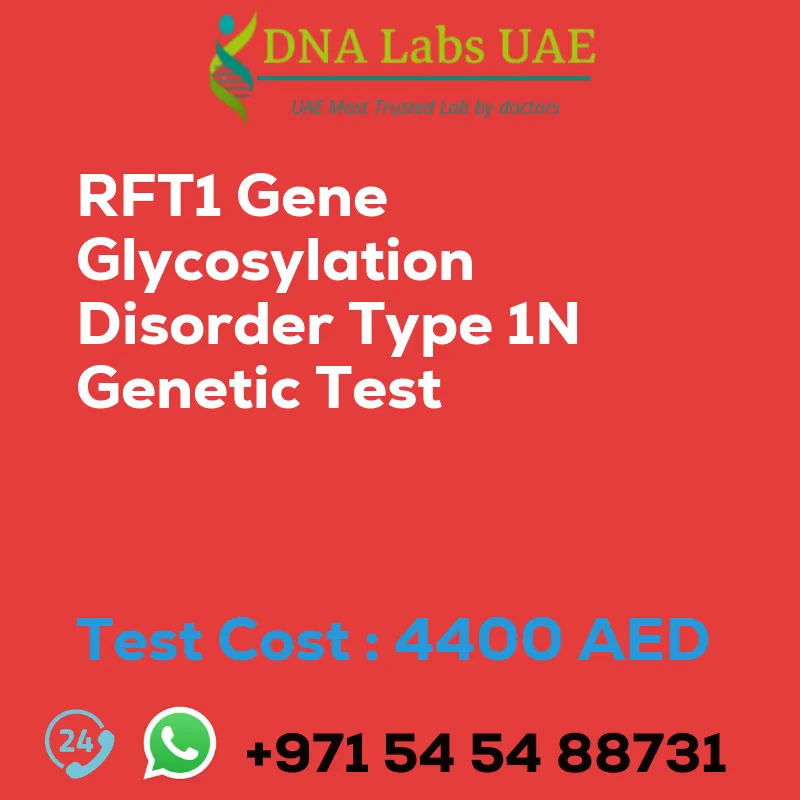
RFT1 Gene Glycosylation Disorder Type 1N Genetic Test Cost
The "RFT1 Gene Glycosylation Disorder Type 1N Genetic Test" is a specialized diagnostic tool available at DNA Labs UAE, designed to identify mutations in the RFT1 gene. These mutations can lead to a type of Congenital Disorder of Glycosylation (CDG), specifically Type 1N, which is a rare genetic condition. CDGs are a group of inherited metabolic disorders that affect the glycosylation process, a critical biochemical pathway responsible for the proper function and structure of most proteins and lipids in the body. Type 1N CDG, linked to the RFT1 gene, can manifest in various clinical symptoms, including developmental delay, neurological issues, and other systemic complications. Early and accurate diagnosis through genetic testing is crucial for managing the condition, as it can guide treatment options and help in understanding the prognosis. The test at DNA Labs UAE involves collecting a DNA sample, usually through a blood draw, and analyzing it for specific mutations in the RFT1 gene. The cost of the test is 4400 AED, reflecting the specialized nature of the analysis and the advanced technology used in detecting these genetic variations. By opting for this test, patients and their families can gain valuable insights into the genetic underpinnings of their condition, enabling more personalized and effective care.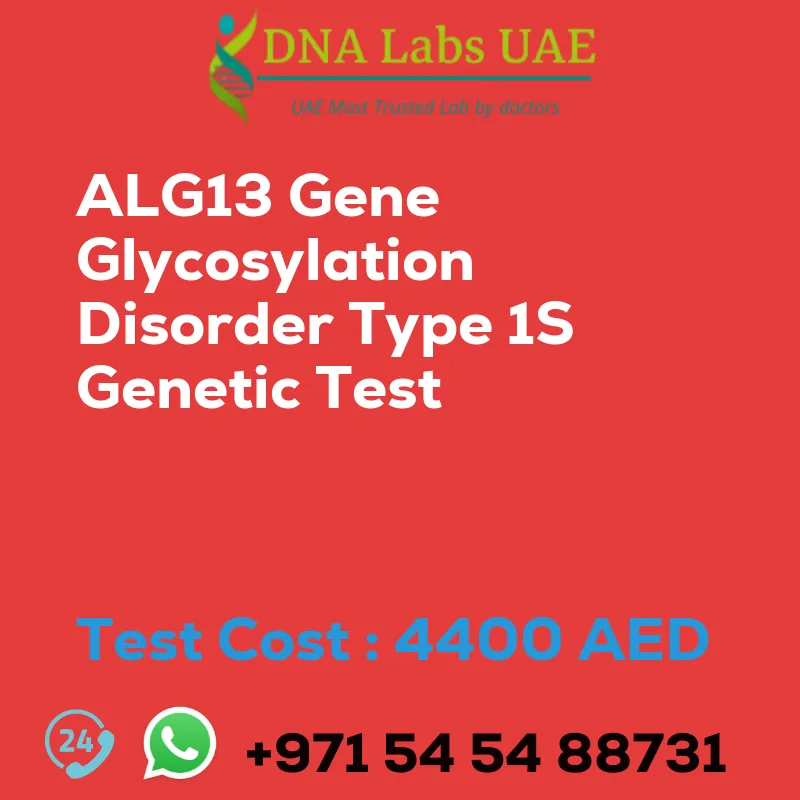
ALG13 Gene Glycosylation Disorder Type 1S Genetic Test Cost
The "ALG13 Gene Glycosylation Disorder Type 1S Genetic Test" is a specialized diagnostic assessment available at DNA Labs UAE, designed to detect abnormalities in the ALG13 gene. This gene plays a critical role in the glycosylation process, a biochemical activity essential for proper protein function and cellular operations. Mutations in the ALG13 gene can lead to Congenital Disorders of Glycosylation (CDG), specifically Type 1S, which is a rare genetic condition that affects multiple systems of the body, including the nervous system, liver, and coagulation processes, leading to a range of symptoms from mild to severe. This genetic test involves analyzing the patient's DNA to identify mutations in the ALG13 gene that are indicative of Type 1S CDG. It is a vital tool for clinicians in diagnosing this condition, enabling them to provide appropriate management and care plans for affected individuals. The test is priced at 4400 AED and is conducted at DNA Labs UAE, a facility known for its advanced genetic testing capabilities and commitment to providing accurate and timely diagnostic services.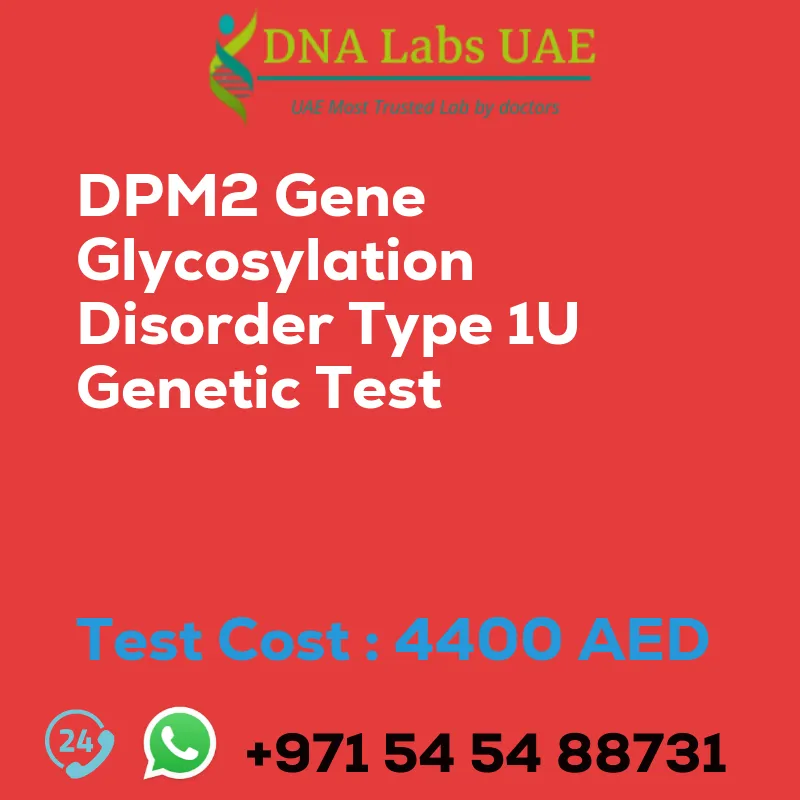
DPM2 Gene Glycosylation Disorder Type 1U Genetic Test Cost
The "DPM2 Gene Glycosylation Disorder Type 1U Genetic Test" is a specialized diagnostic procedure aimed at identifying mutations in the DPM2 gene, which can lead to Congenital Disorders of Glycosylation (CDG). Type 1U, a subtype of this condition, is characterized by various symptoms ranging from developmental delays, neurological issues, to problems with the liver and digestive system. These disorders arise from defects in the glycosylation process, a crucial biological mechanism where sugars are attached to proteins and lipids, affecting their functionality throughout the body. This genetic test is crucial for early diagnosis and management of the disorder, enabling healthcare providers to tailor interventions and support to the specific needs of the patient. Conducted at DNA Labs UAE, a leading facility in genetic diagnostics, the test ensures accuracy and reliability. The cost of the test is set at 4400 AED, reflecting the comprehensive nature of the analysis and the sophisticated technology employed. Early detection through this test can significantly improve the quality of life for individuals with CDG Type 1U, offering insights into potential treatments and supportive care measures.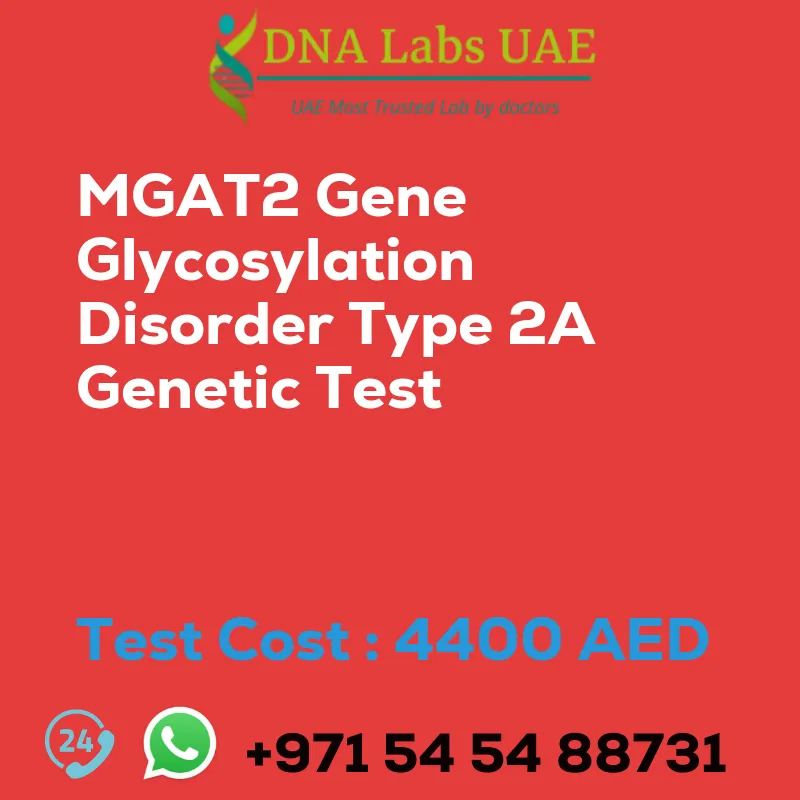
MGAT2 Gene Glycosylation Disorder Type 2A Genetic Test Cost
The "MGAT2 Gene Glycosylation Disorder Type 2A Genetic Test" is a specialized diagnostic procedure available at DNA Labs UAE, designed to identify mutations in the MGAT2 gene. These mutations are responsible for a rare condition known as Congenital Disorder of Glycosylation Type IIa (CDG-IIa), also known as Mannosyl-oligosaccharide glucosidase deficiency. This genetic disorder affects the body's ability to properly attach sugar molecules to proteins and lipids, a process essential for the normal function of various systems in the body. Symptoms of CDG-IIa can vary but often include developmental delay, intellectual disability, liver dysfunction, and problems with blood clotting. Early and accurate diagnosis through the MGAT2 genetic test is crucial for managing symptoms and improving the quality of life for affected individuals. The test is conducted at DNA Labs UAE, a facility renowned for its advanced genetic testing capabilities. The cost of the test is 4400 AED, reflecting the specialized nature of the analysis and the sophisticated technology employed in identifying the genetic mutation. This test is a vital resource for families seeking answers to complex genetic disorders, providing them with essential information for treatment planning and genetic counseling.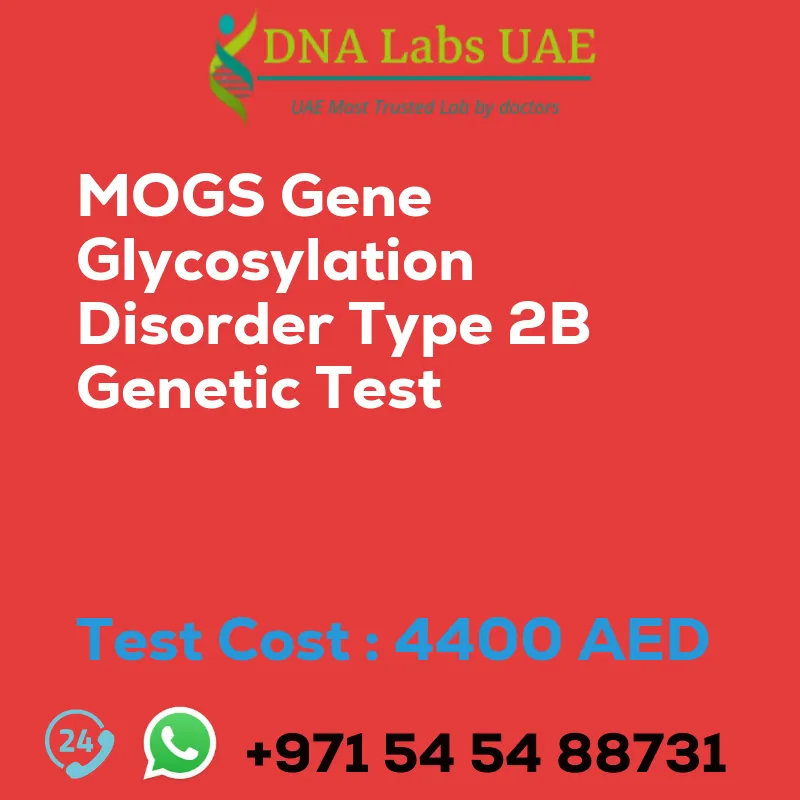
MOGS Gene Glycosylation Disorder Type 2B Genetic Test Cost
The "MOGS Gene Glycosylation Disorder Type 2B Genetic Test" is a specialized diagnostic tool available at DNA Labs UAE, designed to detect abnormalities in the MOGS gene, which can lead to Congenital Disorders of Glycosylation Type 2B (CDG2B). CDG2B is a rare genetic condition that affects multiple systems of the body, including the nervous system, immune system, and more, leading to a range of symptoms from mild to severe. This test specifically looks for mutations in the MOGS gene, which plays a crucial role in the glycosylation process—a process vital for proper protein folding and function. Early diagnosis through genetic testing can be crucial in managing symptoms, preventing complications, and improving the quality of life for those affected by the condition. At DNA Labs UAE, the test is offered at a cost of 4400 AED. The test involves collecting a DNA sample, usually through a blood draw or cheek swab, which is then analyzed in the lab for the presence of mutations in the MOGS gene. Results from this test can provide essential information for families regarding prognosis, treatment options, and the risk of passing the condition on to future generations.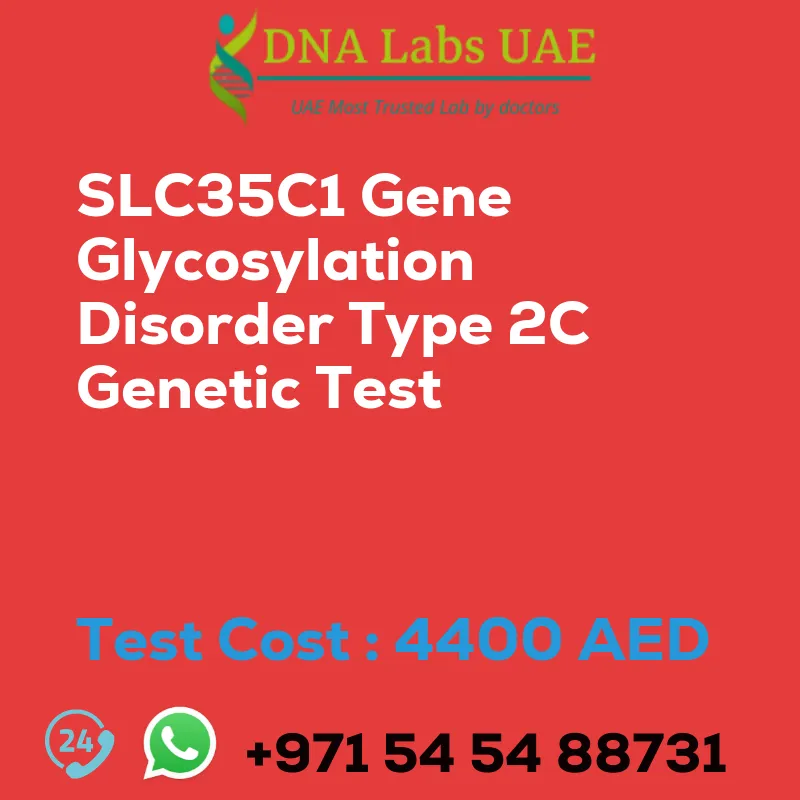
SLC35C1 Gene Glycosylation Disorder Type 2C Genetic Test Cost
The SLC35C1 gene glycosylation disorder type 2C, also known as Congenital Disorder of Glycosylation Type IIc or Leukocyte Adhesion Deficiency Type II, is a rare genetic condition. This disorder affects the glycosylation process, where sugars are added to proteins and lipids, a crucial modification for the proper functioning of various cellular processes. Mutations in the SLC35C1 gene disrupt this process, leading to a range of symptoms including growth retardation, intellectual disability, and immune system deficiencies. To diagnose this condition, a genetic test targeting the SLC35C1 gene can be conducted. This test identifies mutations in the SLC35C1 gene that are responsible for the disorder, providing crucial information for diagnosis, management, and treatment planning. The test involves collecting a DNA sample, usually through a blood draw or cheek swab, and analyzing the genetic material for specific mutations associated with the disorder. In the United Arab Emirates, DNA Labs UAE offers this specialized genetic test. The cost of the SLC35C1 gene glycosylation disorder type 2C genetic test at DNA Labs UAE is 4400 AED. This facility ensures accurate and reliable testing services, employing advanced genetic testing technologies and methodologies to provide patients and healthcare providers with critical genetic information about this rare condition.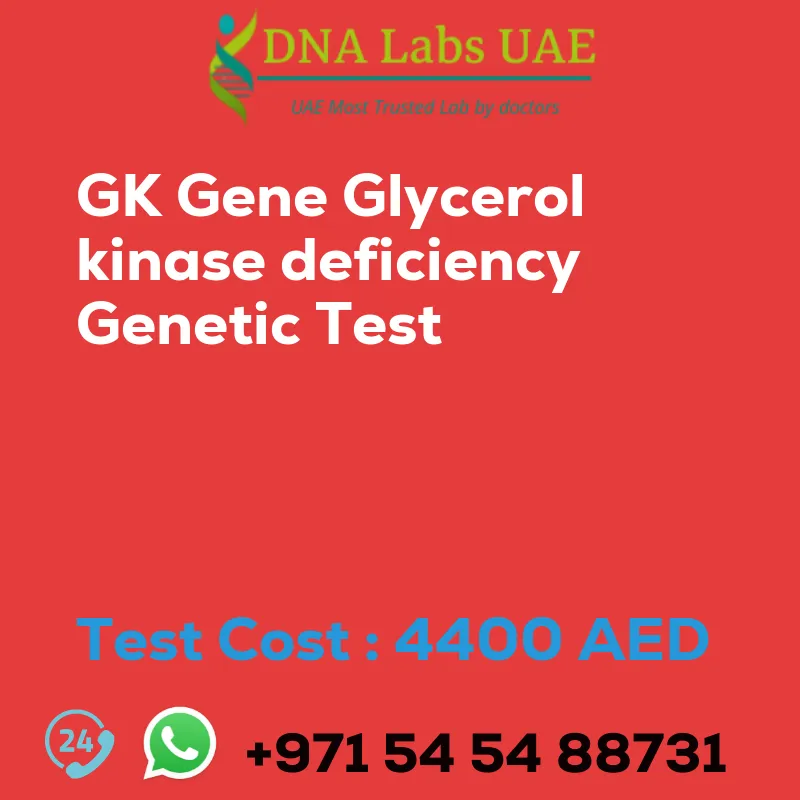
GK Gene Glycerol kinase deficiency Genetic Test Cost
Glycerol kinase deficiency (GKD) is a rare genetic disorder that affects the body's ability to metabolize glycerol, a type of sugar alcohol that is a component of fats. This condition can lead to various symptoms, including hypoglycemia, developmental delays, and in some cases, more severe complications. The condition is caused by mutations in the GK gene, which is responsible for the production of glycerol kinase, an enzyme crucial for the proper metabolism of glycerol. To diagnose this condition, a genetic test can be conducted to identify mutations in the GK gene. In the UAE, DNA Labs offers a comprehensive genetic test for glycerol kinase deficiency. The test involves analyzing the patient's DNA to look for mutations in the GK gene that are known to cause the disorder. This test is crucial for confirming the diagnosis, understanding the severity of the condition, and guiding treatment and management strategies. The cost of the glycerol kinase deficiency genetic test at DNA Labs UAE is 4400 AED. The testing process is designed to be straightforward and efficient, requiring only a simple sample collection, after which the sample is analyzed in the lab. Results are typically provided within a few weeks, offering patients and their families the information needed to proceed with appropriate medical care and support.